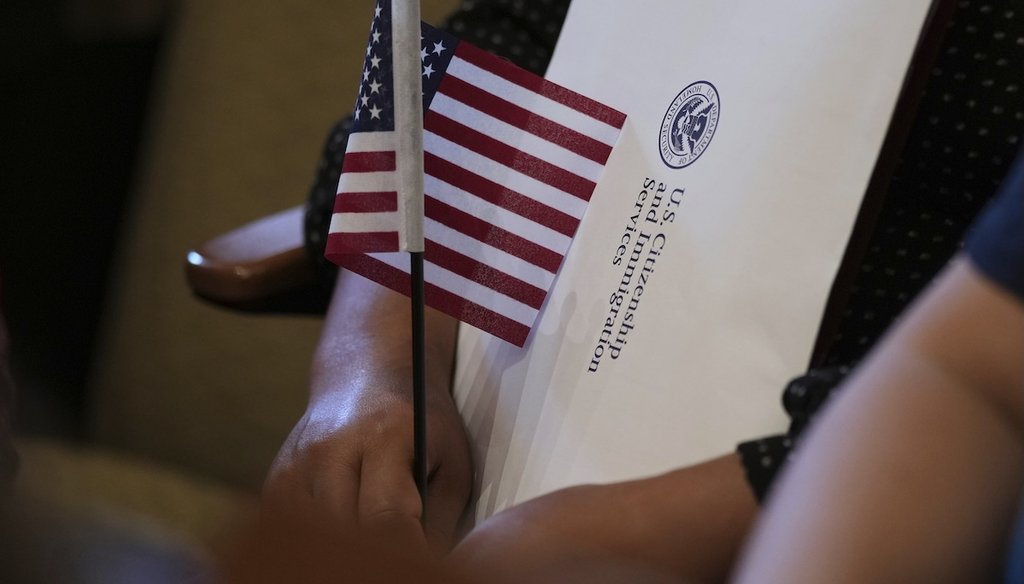Stand up for the facts!
Our only agenda is to publish the truth so you can be an informed participant in democracy.
We need your help.
I would like to contribute

A woman clutches a U.S. flag as she and applicants from 20 countries prepare to take the oath of citizenship in commemoration of Independence Day during a Naturalization Ceremony in San Antonio, July 3, 2025. (AP)
If Your Time is short
-
President Donald Trump cannot revoke anyone’s U.S. citizenship just because he disagrees with them politically or personally.
-
The government cannot strip U.S.-born people of their U.S. citizenship unless the citizens voluntarily renounce it.
-
In limited circumstances, such as fraud, the U.S. government can revoke the citizenship of naturalized citizens — people who were born outside the U.S. and gained U.S. citizenship through a legal process.
President Donald Trump is threatening to strip people of their U.S. citizenship, including political foes, as his administration works to deport people from the country in mass numbers. On July 12, he said he was considering revoking comedian Rosie O’Donnell of her constitutional citizenship right — something no president can do.
Trump has also threatened to rescind former White House adviser Elon Musk and New York City Democratic mayoral candidate Zohran Mamdani’s citizenship. Musk and Mamdani were born outside of the country and received U.S. citizenship through a legal process. The process of stripping them of citizenship is known as denaturalization.
Unlike O’Donnell, who was born in the U.S., the government can strip naturalized citizens of their citizenship under limited circumstances and after a legal process.
The Trump administration wants to pursue more of these cases, though political differences with Musk or Mamdani would not be grounds for denaturalization. Trump’s Justice Department issued a June memo directing attorneys to prioritize denaturalization cases. The memo’s list of priority categories included people who pose national security concerns and gang members and a catchall category for "any other cases referred to the Civil Division that the Division determines to be sufficiently important to pursue."
The memo does not apply to citizens born in the U.S. In 1967, the U.S. Supreme Court ruled that under the citizenship clause of the 14th Amendment, they may only lose their citizenship by voluntarily relinquishing it.
"Once you have American citizenship, you have a constitutional entitlement to it," said Eugene Volokh, a UCLA law professor. "If you like your American citizenship, you can keep your American citizenship — and that's with the Supreme Court's guarantee."
It’s not just Rosie O’Donnell. Trump cannot revoke the citizenship of a person born in the U.S.
In a June 12 Truth Social post, Trump said O’Donnell’s U.S. citizenship "is not in the best interests of our Great Country" and he called her a "Threat to Humanity." O’Donnell moved to Ireland following Trump’s re-election and said she’s seeking Irish citizenship. (Her grandparents were born there.)
Trump and O’Donnell have had a contentious relationship since 2006. O’Donnell has publicly criticized Trump and his policies, and Trump has insulted O’Donnell and her appearance.
Their disagreements have no bearing on her U.S. citizenship. The president cannot strip a U.S.-born person’s citizenship because of personal or political disagreements, legal experts said.
"The Supreme Court has been very clear that native-born U.S. citizens cannot have their citizenship stripped by the government under any circumstances," said Cassandra Burke Robertson, a Case Western Reserve University law professor who studies denaturalization.
Robertson cited a 1958 U.S. Supreme Court case involving a U.S.-born soldier who escaped from a U.S. Army enclosement in Morocco before surrendering to the U.S. Army the next day. The soldier was dishonorably discharged and stripped of his U.S. citizenship.
The Supreme Court ruled that it was unconstitutional to strip the U.S. soldier of his citizenship, calling it a "a form of punishment more primitive than torture."
U.S.-born citizens can voluntarily renounce their U.S. citizenship.
According to immigration law, there are certain acts a U.S. citizen can take that when "performed voluntarily and with the intention of relinquishing U.S. nationality" may lead to a loss of U.S. citizenship.
These acts include serving in the armed forces of another country "engaged in hostilities against the United States," accepting employment with a foreign government if it requires a declaration of allegiance to that country or formally renouncing U.S. citizenship at a consulate.
Being convicted of treason against the U.S. or attempting to overthrow the U.S. government by force, if those acts were done with the intention of relinquishing U.S. citizenship, can also lead to a loss of citizenship for U.S. born people.
How naturalized U.S. citizens can lose their U.S. citizenship
Though limited, there are two ways naturalized U.S. citizens can lose their citizenship. Neither method lets the president revoke citizenship based on political differences.
Trump said he would "have to take a look" when asked whether he would consider denaturalizing Musk, who feuded with Trump over his signature spending bill. Musk was born in South Africa and became a U.S. citizen in 2002.
Trump also baselessly questioned Mamdani’s citizenship saying, "A lot of people are saying he’s here illegally," and asserting his administration would "look at everything." Mamdani, who was born in Uganda, became a U.S. citizen in 2018. Rep. Andy Ogles, R-Tenn., called for the Justice Department to initiate denaturalization proceedings against Mamdani.
The executive branch cannot denaturalize people, Michelle Mittelstadt, communications director for the nonpartisan Migration Policy Institute, said.
"Denaturalization is exceedingly rare and has occurred for people who concealed information of war crimes, Nazi membership, criminal histories, or immigration fraud such as using a stolen identity," she said.
The U.S. government can charge people with naturalization fraud, meaning they secured their citizenship through fraud or wilful misrepresentation or they didn’t meet eligibility requirements. If convicted, a person’s citizenship is automatically revoked.
These are criminal cases in which defendants are entitled to an attorney, Robertson said. There’s a 10-year statute of limitations and the government has the burden of proof beyond a reasonable doubt, she said.
The second way the government can seek to denaturalize a person is through a civil action. In these cases, the government says the person "illegally procured" citizenship, meaning they didn’t meet eligibility requirements.
This process, which is more commonly used by the government, "lacks many constitutional protections," Robertson said. People don’t have the right to a court appointed lawyer, there’s no statute of limitation, no jury trial, and a lower burden of proof.
The Justice Department’s June memo calls for these types of procedures.
PolitiFact Chief Correspondent Louis Jacobson contributed to this report.
CORRECTION, July 15: We corrected the date of Trump's O'Donnell post.
Our Sources
President Donald Trump, Truth Social post, July 12, 2025
Rosie O’Donnell, Instagram post, July 12, 2025
U.S. Department of State, Relinquishing U.S. Nationality, accessed July 14, 2025
Legal Information Institute, 8 U.S. Code § 1481 - Loss of nationality by native-born or naturalized citizen; voluntary action; burden of proof; presumptions, accessed July 14, 2025
Justia, Trop v. Dulles, 356 U.S. 86 (1958), March 31, 2958
U.S. Department of Justice, SUBJECT: Civil Division Enforcement Priorities, June 11, 2025
X, Post, July 1, 2025
Axios, Trump says DOGE may "go back and eat Elon", July 1, 2025
U.S. Supreme Court, Afroyim V. Rusk, Secretary Of State., May 29, 1967
Reason, "Can American Citizens Lose Their Citizenship?" July 14, 2025
Email interview, Cassandra Burke Robertson, Case Western Reserve University director of the Center for Professional Ethics, July 14, 2025
Email interview, Michelle Mittelstadt, Migration Policy Institute communications director, July 14, 2025
Email interview with Michael J. Gerhardt, University of North Carolina law professor, July 14, 2025
Email interview with Eugene Volokh, UCLA law professor, July 14, 2025
Email exchange, White House spokesperson, July 14, 2025




































